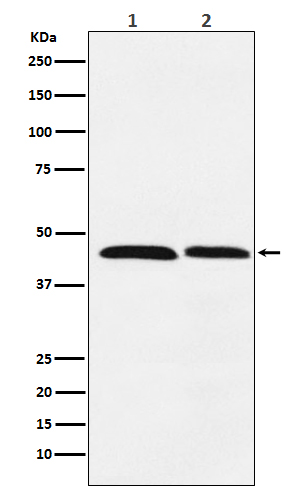
| WB | 咨询技术 | Human,Mouse,Rat |
| IF | 咨询技术 | Human,Mouse,Rat |
| IHC | 1/100-1/200 | Human,Mouse,Rat |
| ICC | 技术咨询 | Human,Mouse,Rat |
| FCM | 咨询技术 | Human,Mouse,Rat |
| Elisa | 咨询技术 | Human,Mouse,Rat |
| Aliases | DNase IV; FEN1; Flap endonuclease 1; Flap structure specific endonuclease 1; hFEN-1; hFEN1; Maturation factor 1; MF1; Rad2;;FEN1 |
| WB Predicted band size | Calculated MW: 43 kDa ; Observed MW: 42 kDa |
| Host/Isotype | Rabbit IgG |
| Antibody Type | Primary antibody |
| Storage | Store at 4°C short term. Aliquot and store at -20°C long term. Avoid freeze/thaw cycles. |
| Species Reactivity | Human,Mouse,Rat |
| Immunogen | A synthesized peptide derived from human FEN1 |
| Formulation | Purified antibody in PBS with 0.05% sodium azide,0.05% BSA and 50% glycerol. |
+ +
以下是3-4条关于FEN1抗体的参考文献及简要摘要内容:
---
1. **文献名称**: *"FEN1 ensures telomere stability by facilitating replication fork re-initiation"*
**作者**: Saharia A, et al.
**摘要**: 研究通过FEN1抗体进行免疫荧光和Western blot分析,揭示FEN1在端粒复制压力下通过促进复制叉重启维持基因组稳定性,并发现FEN1缺失导致复制叉停滞和端粒断裂。
---
2. **文献名称**: *"SUMO modification stabilizes FEN1 and regulates its interaction with PCNA"*
**作者**: Guo Z, et al.
**摘要**: 利用FEN1特异性抗体进行免疫沉淀和蛋白质相互作用研究,证明SUMO化修饰增强FEN1与PCNA的结合,进而调控其在DNA损伤修复中的功能。
---
3. **文献名称**: *"Elevated expression of FEN1 in breast cancer correlates with proliferation and poor prognosis"*
**作者**: Kumar D, et al.
**摘要**: 通过免疫组化(FEN1抗体)分析乳腺癌组织样本,发现FEN1高表达与肿瘤增殖标志物Ki-67正相关,且预示患者生存率降低,提示其作为潜在治疗靶点。
---
4. **文献名称**: *"FEN1 deficiency increases chromosomal instability and accelerates tumorigenesis in mice"*
**作者**: Xie Y, et al.
**摘要**: 研究利用FEN1抗体检测小鼠模型中FEN1蛋白水平,证实FEN1缺失导致染色体异常和自发肿瘤发生率升高,强调其在维持基因组完整性中的关键作用。
---
以上文献均通过FEN1抗体在分子机制、疾病关联或临床诊断中展开研究,涵盖功能分析、翻译后修饰及癌症标志物探索。
The Flap Endonuclease 1 (FEN1) antibody is a crucial tool for studying the role of FEN1. a highly conserved structure-specific nuclease essential in DNA replication and repair. FEN1 plays a pivotal role in processing Okazaki fragments during lagging-strand DNA synthesis by cleaving 5' overhanging flaps, ensuring genomic stability. It also participates in long-patch base excision repair (BER) and stalled replication fork rescue. Dysregulation of FEN1 is linked to cancer, neurodegenerative disorders, and aging, making it a key focus in disease research.
FEN1 antibodies are widely used to detect FEN1 protein expression, localization, and interactions in techniques like Western blotting, immunohistochemistry (IHC), immunofluorescence (IF), and co-immunoprecipitation (Co-IP). These antibodies are typically raised in hosts such as rabbits or mice, targeting specific epitopes (e.g., human FEN1 amino acid residues 50-150). Validated applications and species reactivity (human, mouse, rat) are critical considerations when selecting FEN1 antibodies.
High-quality FEN1 antibodies exhibit specificity confirmed by knockout (KO) validation or siRNA knockdown, ensuring minimal cross-reactivity. They enable researchers to explore FEN1's biological functions, its overexpression in certain cancers (e.g., breast, lung), and its potential as a therapeutic target. Commercial availability from major suppliers (e.g., Abcam, Cell Signaling Technology) ensures accessibility for diverse experimental needs. Proper controls, like isotype-matched IgG and FEN1-deficient cell lysates, are essential for accurate data interpretation.
×